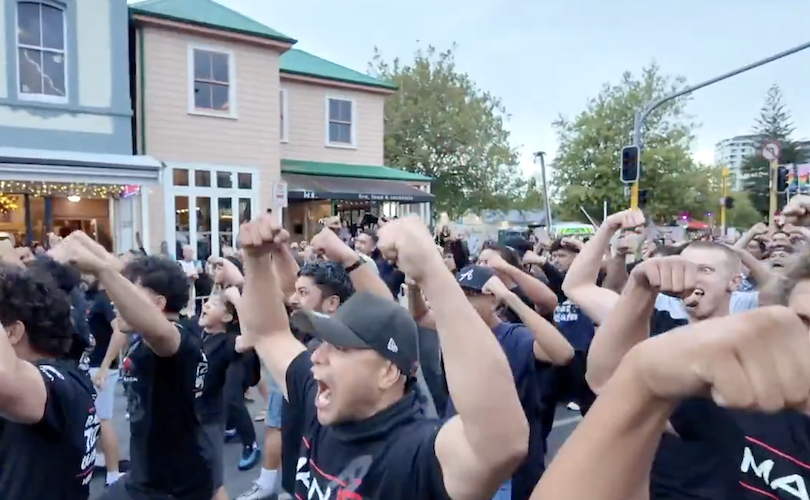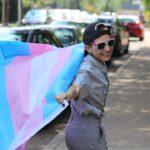Drag Queen Story Hour, Gender Ideology
WATCH: Christian Māori men push back against LGBT colonization in New Zealand
Over the past several decades, the LGBT movement has gone to great lengths to tie their agenda to the identities of other minority groups. In the U.S., they presented their movement as the natural successor of the explicitly Christian civil rights movement and have used civil rights-era legislation to further their cause. In Canada, the term “Two-Spirit” – used to describe Indigenous people who identify as “LGBT” – has been used in an attempt to give the LGBT movement an ancient and respectable pedigree, despite the fact that the phrase is roughly three decades old.
In New Zealand, the LGBT movement has sought to present their agenda as, in part, a blow against colonialism and a defense of the indigenous Māori people. New Zealand’s “self-identification” bill, for example, claims that:
Only recognising binary genders may have had a negative impact specific to Māori. Research suggests that there was [so-called] gender diversity within Te Ao Māori and that has diminished with colonisation. This has negatively affected the acceptance and participation of gender diverse [i.e., gender-confused] Māori in their own communities.
Plenty of actual Māori people have strenuously objected to the colonization of their identity by LGBT activists. Earlier this month, for example, an LGBT march was interrupted by a “flash mob” of Christian Māori men performing their famous, traditional (and intimidating) – “Haka” dance:
A group of Māori men and women similarly protested a “Drag Queen Story Hour” recently.
Most of the participating protesters were associated with the Christian organization “Man Up,” an organization that seeks to assist men in transforming their lives by rejecting addictive substances, becoming better husbands and fathers, and breaking dysfunctional cycles. (The stories on their website are truly inspirational.) Part of being real men, the group understands, is defending children – and thus pushing back against LGBT ideology is essential.
Plenty of other Māori people are deeply outraged by the hijacking of their identity by the LGBT movement, as well. I recently hosted Michelle Uriarau on a panel discussion examining the impact of gender ideology on society, and she expressed anger that her Māori identity was being appropriated by gender ideologues. In 2022, she wrote a response to the government’s claims in a scathing article titled “Pre-Colonial Māori Culture Had No Diverse Gender Identities.” An excerpt:
This is a direct appropriation of our culture. So, why did Māori Members of Parliament who have the power to take the Government to task over such ridiculous claims, remain silent on the matter? I can only speculate.
The truth is that there is no haka, no waiata, no mōteatea, no whakataukī and no whakairo that proves that [so-called] diverse gender identities ever existed in Te Ao and in pre-colonial times for Māori. Humans can never change sex. Regardless of culture, lying to any child about biological reality is incredibly cruel. How a child feels on any given day should never be responded to with off-label cancer drugs to stop their natural pubertal development or radical surgical amputation of their healthy breast or penile tissue. The very idea is horrific to the point of insanity, yet it has been written into New Zealand law.
The answer to the question “what is a woman” is of course, wāhine: adult human female. Only wāhine can bring forth life which is why only wāhine can karanga (make the call of welcome). In “The Man Called to Karanga” which aired on Māori Television in 2018, Pita Tamiana’s mother told him, men do not karanga because it attracts death. Unsurprisingly, Pita discounts his mother’s advice and wisdom, perhaps because he is academically trained? I am not sure, but the emerging picture of our culture being contaminated by certain academics and politics instead of being governed and guided by hapū and kaumatua, as is our custom, is an unsettling one.
I am co-founder of Mana Wāhine Kōrero, the only indigenous group created by indigenous women to advocate for the safeguarding of our wāhine, tamariki, mokopuna and our cultural integrity primarily against gender-identity propaganda.
We refuse to capitulate to this ideology which inserts itself uninvited into our culture, erases our mana as wāhine and hijacks our ability to safeguard in law that which we hold dear above all else; our tamariki and mokopuna.
The truth is that gender ideology is very new; as Uriarau pointed out, “gender-identity ideology originated out of American academia,” not traditional cultures. But the LGBT movement needs to insist that they have a long and storied pedigree, which is why they are constantly claiming that new archaeological finds indicate transgenders everywhere and that any number of historical figures were, if you squint at them just right, clearly “non-binary,” or whatever. To change the present, they must change the past. They must claim that this sudden surge in gender dysphoria and sex change surgeries and sterilizing kids isn’t new—it’s always been this way.
That, of course, is insidious nonsense – which is why LGBT parades are being suddenly faced down by groups of Māori men doing the haka, fed up with being told that their past looks like the gender studies department circa 2025.








